Yes, guitar gloves are a real thing! But, I’ll bet you’re asking yourself, do guitar gloves work, and more importantly, will they work for you? The answer is that everyone’s experience with guitar gloves can be a little different! In this article, I’ll reveal everything you need to know about guitar gloves and the pros and cons of using them.
Keep reading to learn more!
You can use the table of contents below to take you to the area that interests you. Click on the little box to open it, and then click on the section of the article you want to read, or you can read from start to finish if you want the full guitar glove experience!
The Short Answer
Guitar gloves can help improve hand and finger discomfort if you are an intermittent (off and on again) player, engage in long practice sessions and performances, or have certain hand and skin conditions. Everyone can have a different experience with how well guitar gloves will work for them. It’s important to give yourself enough time to become accustomed to the feel of the gloves. They can be used on a temporary or permanent basis.
Keep On Reading (Below) To Learn More
What Are Guitar Gloves?
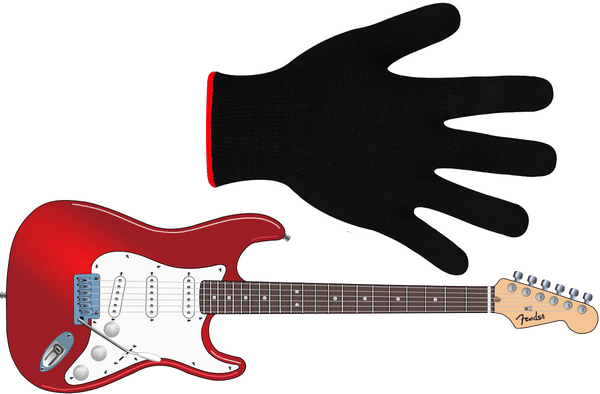
Guitar gloves are made of a special woven nylon material that is thin and lightweight. They have been in use for a number of years now. They are designed to fit “skin-tight,” but not uncomfortably so, to allow the player to perform accurately.
You may have seen various musicians playing with gloves on one or both hands. It looks a little strange, but they can be helpful in several ways.
They are commonly worn as a single glove on the left hand to help finger notes on the guitar neck, but some players use them on both hands.
Guitar gloves are usually sold in a pack of two and various colors, including white, beige, and black. The gloves are typically “ambidextrous,” so they can be used on either hand.
Do Guitar Gloves Come In Different Sizes?
Yes, most gloves come in various sizes.
For example, Musician’s Practice Glove makes gloves in five different sizes, extra small (XS), small (S), medium (M), large (L), and extra large (XL), and three different colors (white, beige, and black).
It’s essential to find gloves that fit correctly. A glove that is too loose can hinder your playing, and wearing a glove that is too tight can cause discomfort to your hand and fingers.
Consult the manufacturer to determine how to measure your hand for the proper glove size.
What Instruments Do They Work For?
Guitar gloves are most commonly used by guitar and bass guitar players, but they can be helpful for a number of stringed instruments, including the ukulele, banjo, mandolin, violin, and cello.
Bass guitar and cello players find them especially useful because of the string thickness of their instruments.
No matter what instrument you play, if you are having problems with your hands, it might be worth giving gloves a try.
How Long Do Guitar Gloves Last?
It’s difficult to say how long your gloves will last. It depends on things like what brand you buy, what instrument you play, your playing style, and how many hours a day you use them.
Some players say that a good set of gloves can last between 25 and 50 hours of continuous playing or longer.
Keeping your guitar neck and strings clean can extend the life of a glove even further. Sharp fret edges can damage the glove’s material.
Pros And Cons Of Guitar Gloves


Here are some things to be aware of based on my personal experience and the opinions of my fellow musicians over the years.
| Pros | Cons |
|---|---|
| Helps hand and finger fatigue | Could make you look like an amateur |
| Allows calluses to form with less pain | May slow down callus formation |
| Improves playing speed and precision | Can make your playing feel “unnatural” |
| Absorbs sweat | Finger may slip with string bends |
| Keeps hands warm | Finger vibrato may be difficult |
| Improves playing with medical conditions | Can cause nerve irritation |
| Helps nickel allergy | Proper sizing is critical |
| Cost-friendly | You may be allergic to the glove material |
Keep On Reading (Below) To Learn More About Each Topic
Why Use Guitar Gloves?
Here are some of the common reasons guitar gloves might be helpful. Medical conditions are covered in the next section.
Beginning Or Intermittent Players
Some beginning guitar players may find it difficult to deal with fingertip soreness as they are waiting for calluses to develop, especially if they are starting on an acoustic or bass guitar.
If you play your instrument now and again, you may find yourself in the same situation.
Using a guitar glove may allow you to form enough of a callus that you can eventually play comfortably with your bare hand.
Warm-Up Workouts
A guitar glove may offer finger comfort for players that use challenging workout routines, like scales and arpeggios, while warming up their fingers before a show.
Extended Practice Or Playing Sessions
Some players who have rigorous practice schedules, play long sets during a show, or change instruments frequently (like bass, acoustic, and electric guitar) during a performance use guitar gloves to help alleviate soreness and keep their sound consistent.
Improvement Of Playing Speed And Precision
I’ve heard some players claim that the glove’s nylon material has actually allowed them to move their hand up and down the neck easier and quieter, especially when sliding chorded notes like power chords.
Also, some players claim that a glove makes it easier to do finger bends, vibrato, hammer-ons, and pull-offs, while others claim just the opposite!
Outdoor Playing
Guitar gloves can help keep your hands warm when playing outdoors in cold weather and prevent finger cramping. During warm and humid weather, the gloves can help wick moisture to keep your hands dry.
Playing Better With Medical Conditions
Guitar players have used gloves to help alleviate playing problems associated with various medical conditions. If you have a medical problem affecting your playing, check with your doctor before trying guitar gloves.
Sweaty Hands (Hyperhidrosis)
Some people just have naturally sweaty hands, which can get even worse during periods of stress and anxiety. The technical medical term is hyperhidrosis.
Sweat is the enemy of guitar strings and necks. It can significantly decrease string life and cause a buildup of dirt and dead skin cells on the fretboard and frets.
Guitar gloves can absorb sweat and help keep your guitar clean and sounding its best.
Skin Problems
There are a variety of skin problems that can make fingering and picking notes on the guitar painful. Wearing guitar gloves can help control the discomfort of playing and help prevent the condition from worsening.
Eczema and psoriasis can cause skin drying, making the fingertips more susceptible to cracking, cuts, and blistering. Aging of the skin can make it less resilient.
Arthritis
Arthritis can affect the bones in the hands and fingers, making it more difficult to press down on the guitar’s string and neck without causing underlying discomfort.
Neurologic Problems
Neurologic problems can affect the movement and sensitivity of the hands and fingers. Guitar gloves may offer some degree of symptom relief.
Movement disorders like essential tremor and focal dystonia can cause involuntary spasms and jerking that can be painful and damage skin on the fingertips while playing.
Peripheral neuropathy may lead to painful sensory disorders like focal dysesthesia, with tingling, pins and needles, itching, burning, and stinging of the hands and fingers.
Vascular Problems
Peripheral vascular disease can cause thinning and brittleness of the skin of the hands and fingers. Raynaud’s disease can cause the fingers to become cold and uncomfortable.
Allergies
An allergic reaction to the nickel in frets and some guitar strings can cause contact dermatitis.
Is There A “Downside” To Using Guitar Gloves?
Yes, there are some potential downsides to using guitar gloves.
Some guitarists avoid using them because they don’t want to look “foolish” or be perceived by others as an amateur player. Guitar gloves are available in beige, which is more difficult to notice, especially on a stage far away from the audience.
Wearing guitar gloves can be more comfortable for beginning players, but they can slow down callus formation on the fingertips or prevent enough callus formation to be able to play without the glove.
Some guitarists claim that the gloves make their playing feel “unnatural,” especially the more experienced players. The slippery feeling of the nylon gliding over the strings can allow players to overshoot position changes and cause the fingertip to slip off the string while bending it or doing vibrato.
If your guitar gloves are too tight, they might cause what some people refer to as “cutting off the circulation,” which is most likely irritation of the hand’s superficial nerves. This can make cause a “pins and needles” sensation or even make your hand feel like it is falling asleep.
Gloves that are too loose-fitting can be difficult to play with precision. Therefore, getting the right size to fit your hands comfortably is critical, especially if you plan to play a long session.
Some players are allergic to nylon, which can cause a contact skin reaction known as “textile dermatitis.”
My Experience With Guitar Gloves
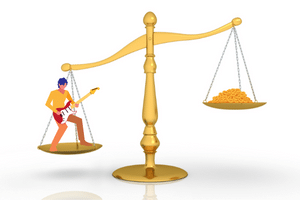
I had the opportunity to wear a guitar glove on my left hand several years ago after sustaining several minor cuts and abrasions on my palm and fingers while working outdoors.
I found the glove a bit challenging to get used to. It took me several days to become accustomed to the unnatural feeling of my fingers against the guitar’s neck. I also had some difficulty getting my string bends and vibrato as accurate as they should have been.
The glove actually caused my left hand to sweat after an hour or so of aggressive playing.
I would have to say that I was happy to ditch the glove when my skin healed but that I would not have been able to play without it.
To be fair, guitar gloves have come a long way since this encounter. I recently tried a pair of Musician’s Practice Gloves made by a company out of Elizabethtown, Pennsylvania. I found them to be a good solution to dealing with various hand and finger problems.
They are much easier to play well-defined notes, even when bending strings and doing finger vibrato, than the older pair I discussed above. These gloves are getting positive feedback from guitar and bass guitar players and are used by players like UK bassist Scott Devane, who apparently has focal dystonia.
Where Can You Buy Guitar Gloves?
Although I have seen guitar gloves in some local music stores over the years, it’s generally easier to find them online.
I’ve seen the Musician’s Practice Gloves for sale on Amazon, Sweetwater, and eBay.
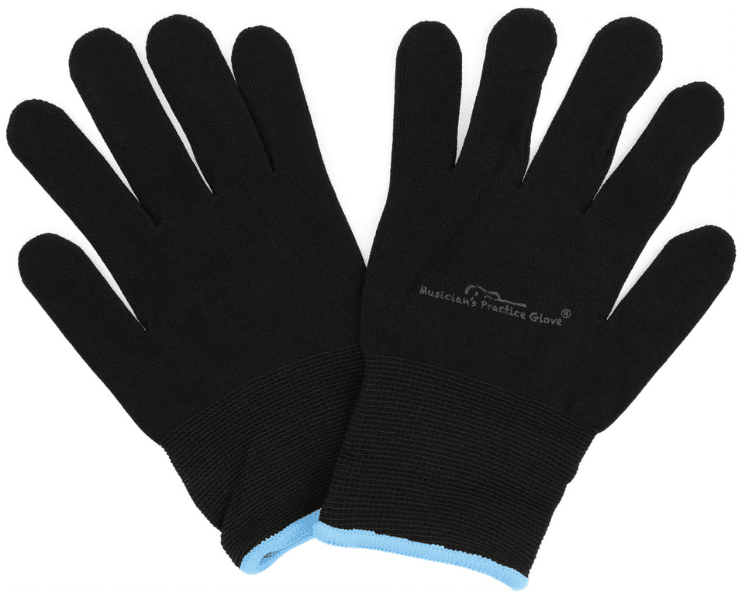
Click HERE To Check Reviews & Price On Amazon
They are available in five different sizes, extra small (XS), small (S), medium (M), large (L), and extra large (XL), and three different colors (white, beige, and black).
These gloves stretch to fit nicely on your hand and fingers and are sheer enough to see your fingernails and skin underneath.
Frequently Asked Questions

Here are some of the questions I get asked about hand problems.
If your question does not appear here, please put it in the comments, and I will get right back to you with an answer.
Are Calluses Necessary For Guitar?
Yes, calluses are necessary if you play guitar routinely because they help protect your fingertips and prevent finger discomfort. Even if you use a guitar glove, you will eventually develop some degree of finger calluses.
Do Calluses Go Away If You Stop Playing Guitar?
Yes, calluses are not permanent and will eventually disappear after you stop playing the guitar. If you are an intermittent guitar player, give yourself a few days for calluses to begin to develop before playing more extended sessions.
Do Calluses Hurt A Guitar?
No, calluses will not hurt the fretboard of your guitar. Calluses are built-up layers of dead skin and have minimal if any, abrasive action on your guitar neck.
Are Small Hands A Disadvantage For Guitar?
Small hands can make it challenging to play a guitar with a large neck that is not set up correctly. The best approach is to play various guitars until you find the one that feels good and plays well for you. Light gauge strings and a lower action (string height) can help.
Why Do Guitarists Tape Their Hands?
Guitar players sometimes tape the fingers of their picking hand to protect them from string damage, especially when playing fast passages on heavy gauge strings.
Are Guitar Finger Protectors Worth It?
Yes, wearing finger protection, such as guitar gloves, can help alleviate finger discomfort if you have skin problems or play long sessions. You may have to try various products to see what works best for you. It’s essential to give your hands and fingers time to adjust to the finger protection before you can play your best.
Final Thoughts

So, do guitar gloves work? They can be effective in certain situations. The reason why you need them, the instrument you play, your playing style, and how many hours a day you use them can all be factors.
These gloves are not a new concept. They are made from a lightweight, thin woven nylon material designed to fit skin-tight. Choosing the proper size glove is essential. Loose-fitting gloves will make it difficult to play correctly, and gloves that are too tight can cause discomfort.
Guitar gloves are commonly used by guitar and bass guitar players, but they can be helpful for many stringed instruments, including the ukulele, banjo, mandolin, violin, and cello.
There are a variety of reasons to use guitar gloves, but they are typically used by intermittent players, pros that have extended practice and performance sessions, and by those with skin conditions.
Although some guitarists claim guitar gloves have improved the speed and precision of their playing, I would not recommend them for use by every player. I still favor playing with bare hands if they are not solving a particular problem. Slowly build up your finger calluses and progressively improve your playing skills with routine practice.
The best way to find out if guitar gloves are right for you is to give them a try. Be sure to allow enough time to acclimate to the new playing experience.

Related Article ➡ Why Guitarists Tape Their Hand – Is This The Best Way To Go?
Related Article ➡ Fingertips Hurt Playing Guitar? – How To Stop The Pain!
Here’s a video from Musician’s Practice Glove, during which the gloves are being briefly reviewed on a music podcast called “The Subject Is Moot.” Check it out!
Tell Me What You Think
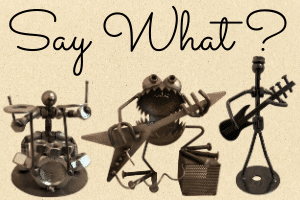
Please leave a comment below if you enjoyed this article, have any questions about guitar gloves, or want to give your point of view. I will be happy to help you.
- Did this article change your opinion about guitar gloves?
- Do you routinely use guitar gloves? Why?
- How helpful have you found guitar gloves?
- What else is on your mind?

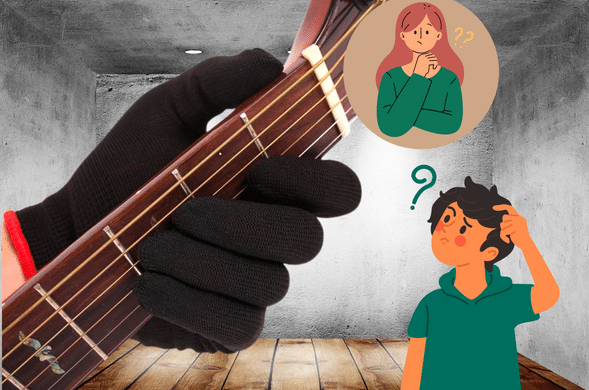

I have found guitar gloves to be helpful in improving hand and finger discomfort during my playing. They have helped with hand and finger fatigue, and improved my playing speed and precision. While there are some cons to using guitar gloves, such as potentially making me look like an amateur, making playing feel “unnatural,” and potentially causing hand sweat, I have still found them to be helpful overall in my experience with playing the guitar.
Hi, Leo
Thank You for your comments!
I’m glad you’re playing well using guitar gloves! Although they’re not for everyone, I have seen many musicians benefit from them, temporarily or permanently.
Keep on Playin’ 👍
Frank 🎸
It is not only you. Getting used to wearing gloves for guitars can be very difficult. But if you want a neat and soft palm, you need to protect your palm. Thank you for mentioning calluses too. They are essential for the protection of our fingertips. If you play for leisure, you may not see their effects, but as a professional they are essentials.
Hi, Ayodeji
Thank You for your comments!
I agree that guitar gloves definitely have their use, although I feel that the average guitar player should be able to get along nicely without them. 😎
Frank 🎸